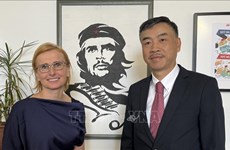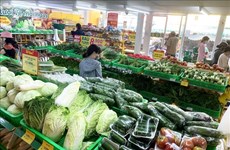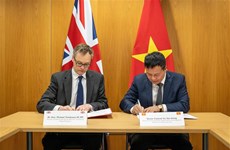Prime Minister’s India visit to improve strategic partnership
PM Nguyen Tan Dung’s official visit to India from
Oct. 27-29 aims to carry bilateral strategic partnership forward.
Prime Minister Nguyen Tan Dung’s scheduled official visit to India from
October 27-29 aims to carry the bilateral strategic partnership forward.
The long-standing relationship between the two countries was started by President Ho Chi Minh and Prime Minister Jawaharlal Nehru and nurtured by generations of Vietnamese and Indian leaders and people.
With the diplomatic ties coming into existence in January 1972, Vietnam and India later formed their strategic partnership in 2007 around five pillars of politics, national defence-security, economics-trade, science-technology, and culture and personnel training.
Mutual visits were made by senior leaders and officials at all levels, from Party chiefs, Presidents, top legislators, Prime Ministers to ministers.
In 2003, the two countries established an annual political dialogue mechanism between the two foreign ministries, making it a regular platform to talk about regional and global issues of shared concern, besides other cooperative mechanisms such as the Vietnam-India Inter-governmental Committee, the Joint Sub-committee on Trade and a defence dialogue.
Vietnam and India have worked closely together at global and regional forums such as the ASEAN-India dialogue, East Asia Summit, the Non-Aligned Movement and the United Nations (UN). Vietnam backed India as a non-permanent member of the UN Security Council for the 2011-2012 tenure.
India, in turn, sided with Vietnam in its bid to join the UN Human Rights Council for 2014-2016 term and seek a non-permanent seat at the UN Security Council for 2020-2021 term.
On the East Sea issue, India has supported Vietnam’s stance on the peaceful settlement of disputes in line with international law, including the 1982 UN Convention on the Law of the Sea and the Declaration on the Conduct of Parties (DOC) in the East Sea.
The South Asian country also backs maritime security, safety and freedom and the right to access resources in the East Sea in accordance with international law, vowing to continue cooperating with Vietnam on oil and gas issue and calling for concerned parties to respect the principles of international law, deal with existing problems through negotiations, observe the DOC and soon conclude talks on a Code of Conduct in the East Sea.
Regarding bilateral economic and trade ties, two-way trade surged 35 percent year-on-year to 5.23 billion USD in 2013, including 2.3 billion USD worth of Vietnam’s exports, mostly coal, pepper, electronic accessories, rubber, fiber, footwear and chemicals. The two sides have set the target of 10 billion USD in trade by 2015 and 15 billion USD by 2020.
India has recognised Vietnam as a market economy.
By May 2014, India poured 273 million USD into 78 projects in Vietnam, primarily in oil and gas, mineral processing, sugar, agricultural chemicals, information technology and farm produce processing.
The two countries have increased bilateral cooperation in national defence during recent years, with their armies, navies and air forces sharing experience and working together in training. A deputy ministerial-level strategic defence dialogue was launched in 2003 and India has pledged to help Vietnam modernise its defence capability and personnel.
Bilateral ties in other aspects have also been shored up. Both nations have regularly held artistic and cultural exchanges to raise mutual understanding between the two peoples. India is also working to open a cultural centre in Hanoi.
Annually, the Indian government offers scholarships to 150 Vietnamese students pursuing short-term and long-term courses on agriculture, information technology, economics, law, English language and remote sensing. More and more Vietnamese students are choosing India as a destination for study thanks to its quality and affordable education.
Started out in 1997, the Vietnam – India Sub-Committee on Scientific and Technological Cooperation has so far convened nine meetings and carried out 13 projects across IT, cultivation, breeding, industry and environment.
The two nations have signed many agreement and MoUs covering cooperation in diverse areas.-VNA
The long-standing relationship between the two countries was started by President Ho Chi Minh and Prime Minister Jawaharlal Nehru and nurtured by generations of Vietnamese and Indian leaders and people.
With the diplomatic ties coming into existence in January 1972, Vietnam and India later formed their strategic partnership in 2007 around five pillars of politics, national defence-security, economics-trade, science-technology, and culture and personnel training.
Mutual visits were made by senior leaders and officials at all levels, from Party chiefs, Presidents, top legislators, Prime Ministers to ministers.
In 2003, the two countries established an annual political dialogue mechanism between the two foreign ministries, making it a regular platform to talk about regional and global issues of shared concern, besides other cooperative mechanisms such as the Vietnam-India Inter-governmental Committee, the Joint Sub-committee on Trade and a defence dialogue.
Vietnam and India have worked closely together at global and regional forums such as the ASEAN-India dialogue, East Asia Summit, the Non-Aligned Movement and the United Nations (UN). Vietnam backed India as a non-permanent member of the UN Security Council for the 2011-2012 tenure.
India, in turn, sided with Vietnam in its bid to join the UN Human Rights Council for 2014-2016 term and seek a non-permanent seat at the UN Security Council for 2020-2021 term.
On the East Sea issue, India has supported Vietnam’s stance on the peaceful settlement of disputes in line with international law, including the 1982 UN Convention on the Law of the Sea and the Declaration on the Conduct of Parties (DOC) in the East Sea.
The South Asian country also backs maritime security, safety and freedom and the right to access resources in the East Sea in accordance with international law, vowing to continue cooperating with Vietnam on oil and gas issue and calling for concerned parties to respect the principles of international law, deal with existing problems through negotiations, observe the DOC and soon conclude talks on a Code of Conduct in the East Sea.
Regarding bilateral economic and trade ties, two-way trade surged 35 percent year-on-year to 5.23 billion USD in 2013, including 2.3 billion USD worth of Vietnam’s exports, mostly coal, pepper, electronic accessories, rubber, fiber, footwear and chemicals. The two sides have set the target of 10 billion USD in trade by 2015 and 15 billion USD by 2020.
India has recognised Vietnam as a market economy.
By May 2014, India poured 273 million USD into 78 projects in Vietnam, primarily in oil and gas, mineral processing, sugar, agricultural chemicals, information technology and farm produce processing.
The two countries have increased bilateral cooperation in national defence during recent years, with their armies, navies and air forces sharing experience and working together in training. A deputy ministerial-level strategic defence dialogue was launched in 2003 and India has pledged to help Vietnam modernise its defence capability and personnel.
Bilateral ties in other aspects have also been shored up. Both nations have regularly held artistic and cultural exchanges to raise mutual understanding between the two peoples. India is also working to open a cultural centre in Hanoi.
Annually, the Indian government offers scholarships to 150 Vietnamese students pursuing short-term and long-term courses on agriculture, information technology, economics, law, English language and remote sensing. More and more Vietnamese students are choosing India as a destination for study thanks to its quality and affordable education.
Started out in 1997, the Vietnam – India Sub-Committee on Scientific and Technological Cooperation has so far convened nine meetings and carried out 13 projects across IT, cultivation, breeding, industry and environment.
The two nations have signed many agreement and MoUs covering cooperation in diverse areas.-VNA













